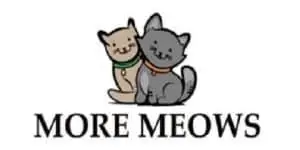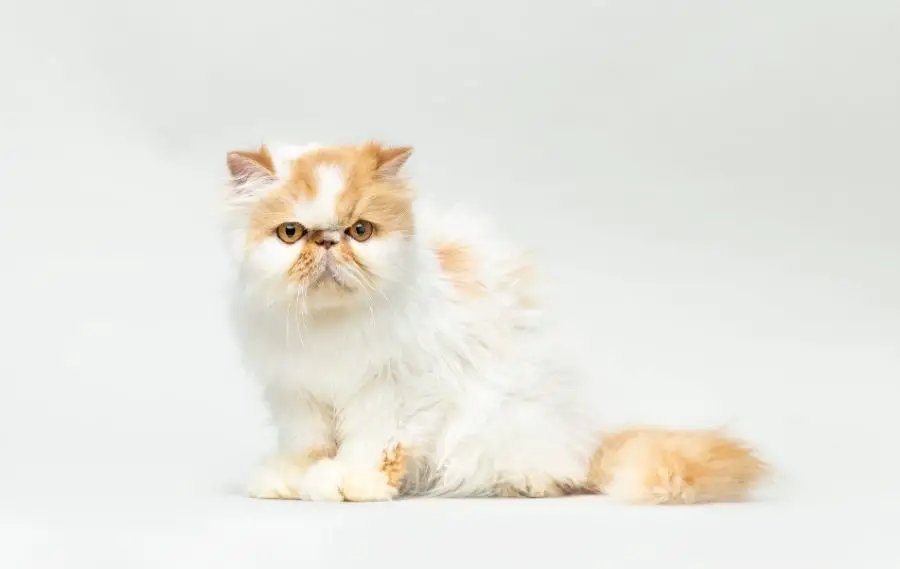More Meows is an Amazon Associate. As an Amazon Associate we earn from qualifying purchases. We may also earn commissions if you purchase products from other retailers after clicking on a link from our site.
Cat hair falling out can be genuinely concerning for pet owners. Your Persian cat could be suffering from some health conditions that could be eliminated with a few changes.
There are multiple causes for why Persian cat hair falls out, but learning about the cause of any hair loss in your Persian cat can help ease your anxiety and help your cat live a long and happy life!
The nine reasons for Persian cat hair loss are:
- Seasonal Changes
- Changing Cat Food
- Allergies
- Fleas and Ticks
- Natural Aging
- Stress
- Hormonal Changes
- Pain
- Internal Health Issues
Seasonal Changes Can Affect Cat Hair
Persian cats are natural shedders. Your cat will naturally shed its coat twice a year to keep its hair healthy. So, some shedding is a normal part of a Persian cat’s life.
To read more about the shedding of the Persian cat and other shedders, check out our article: Click Here.
But the seasons changing during fall and spring can cause your cat to shed its fur to get ready for the next season. After your cat sheds, you will notice that for a while, less hair will fall out due to your Persian cat’s shortened coat.
A change in season can cause an allergic reaction in Persian cats. If your cat is in an environment with a dry climate, they are more likely to have dry skin. This can cause itching and hair loss in your cat.
Changing Cat Food
If you notice your Persian cat is shedding more after you change their diet, it could be due to the food they are eating. If you changed their diet to low-quality cat food that could be a problem.
Persian cats require a healthy diet to keep a healthy and luscious coat. The nutrients and amino acids in their food can help keep the shedding at bay.
Shedding is a natural function for your Persian cat, but this bodily function can be made more severe due to poor nutrition. Ensure your cat is getting the proper diet and nutrition; read food labels, and make sure the food you have chosen is best for your cat!
Foods that promote healthy skin and coat are beneficial due to their targeting strategy to provide nutrition to the proper places to decrease shedding in your cat.
Besides food, it is also important for your Persian cat to be hydrated for optimum health. Check out our article on if Persian cats drink water: Click Here.
Persian Cat Allergies
Just like humans, Persian cats can have allergies. When your cat is introduced to an environmental or food allergen, such as pollen or ragweed, it can cause your cat to become itchy and over-groom themselves causing hair loss.
Persian cats can also be allergic to flea saliva, causing a more severe reaction and your cat to over-groom themselves.
Fleas and Ticks on Cats
Along with allergies, your cat may have little carriers on them. If you observe that your cat seems to be scratching more often or shedding at an unusual time of the year, little travelers such as fleas, ticks, lice, or even mites could be the problem.
These little parasites will burrow into your cat’s skin and cause excessive biting, scratching, and shedding. Your cat might even have spots where there is no fur left.
If you notice this, make sure that you tackle this problem immediately. It can even be a problem for humans and cause an allergic reaction, just like in Persian cats.
Aging Persian Cats Lose Hair
If your Persian cat is on the older side, it may become difficult for them to do their daily grooming. This can lead to a buildup of hair into mats and force them to shed more hair.
Cats naturally brush themselves against objects, and it combs their fur. But an older cat might not move around as much and will require you to help them out.
An older Persian cat will need you to brush them regularly so they can keep a healthy and luxurious coat.
Feline Hair Loss from Stress
For any animal, stress can be a harmful thing. Moving to a new place, being introduced to someone new, or even just a small change in their life can cause your feline to become stressed.
When Persian cats become stressed or scared, they tend to shed more of their hair. These are the hairs that would have been shed during the next bi-yearly shed. The rapid shedding of these at a different time of year can be a leading indicator that your cat needs to be comforted.
Speaking of stress, your feline may get stressed out when you leave the house. Check out our article on if Persian cats miss their owners: Click Here.
Hormonal Problems in Cats
Just like humans, when a cat gets older, its hormonal levels change. A Persian cat can experience hair loss from changes in reproductive hormones. This typically occurs in male cats before they are neutered.
Each cat is different, but if you notice that your Persian cat is losing hair around its stomach, thighs, or back of the neck, you should make an appointment with your veterinarian to start hormonal regulating therapy.
In female cats, hormonal changes can occur if they are pregnant. Pregnancy can cause the fur on the Persian cat’s belly to fall out due to its lactation preparation.
Your Cat is Experiencing Pain
Sometimes it can be challenging to determine if your pet is in pain. A Persian cat may end up licking an area of tender skin so much that it causes hair loss.
Arthritis in joints might be the cause of your cat’s pain or even a broken bone. If you notice your cat is continuously licking the same spot, a trip to the veterinarian will help them manage the pain.
Internal Health Issues Result in Cat Hair Loss
Sometimes there will be no outward signs as to why your Persian cat is losing hair. Cancer or hyperthyroidism are two diseases that can affect your cat’s fur.
Hyperthyroidism can cause your cat to lose weight drastically and, along with it, hair. Due to a lack of nutrients being kept steady in the body, a Persian cat will lose its hair to lack amino acids.
Radiation and medicine used to treat cancer can force your cat to lose its hair. This disease will probably be more noticeable through other factors, but losing hair can be a small sign that something might be internal wrong with your Persian cat.
How Can I Stop my Persian Cat from Losing Hair?
There are a couple of things you can do to help stop your Persian cat from losing its hair. Each of these tasks can help your cat live a healthy life and eliminate problems.
Grooming your Persian Cat
A good habit to get into is brushing your cat’s hair. Since a Persian cat tends to have longer hair, it will need to be brushed out more frequently to eliminate loose hair and rapid shedding. Just be careful not to over-groom, because that can cause more hair loss!
Also, cutting your cat’s hair can help eliminate shedding. Most Persian cats are given a lion’s haircut, which means it is cut short. This will allow for less shedding and keep your cat’s hair clean.
Bathing your cat is another piece of this process. Washing your cat with shampoo specifically supposed to help with its coat will help eliminate dead hair and help bring nutrients back to the hair, reducing shedding!
Persian Cat Nutrition
Another way to help eliminate shedding is by good nutrition. For Persian cats, a diet high in amino acids and nutrients will help them keep a healthy coat. This should help curb the shedding to twice a year.
Hydration is also essential for cats, so make sure you leave water out for them to drink. Without water, there could be some more shedding issues.
Persian Cat Veterinarian Visit
If you are concerned about your Persian cat’s amount of shedding and not of the following things, have helped, see your veterinarian, and get your cat a thorough exam to assess possible care options and solutions.
Conclusion
There are many reasons that may be contributing to your Persian cat losing hair. These reasons are seasonal changes, changing cat food / low-quality food, cat allergies, fleas and ticks, natural aging in cats, cat stress, hormonal changes, pain, and internal health issues.
You should keep all these things in mind, but it makes a lot of sense to consult a veterinarian.
If you enjoyed this article, check out a couple of our other Persian Cat articles:
- Persian Cat Mating Guide: Click Here.
- Do Persian Cats Have Hair or Fur: Click Here.


